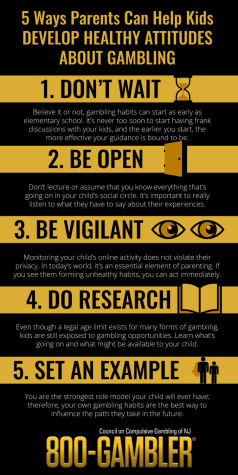Risky Bet
More students – here and nationwide – are gambling on sports despite the risks

Despite being illegal, more students are participating in online gambling since it was legalized for adults over 21 in Illinois.
April 11, 2023
Although sports betting is illegal for Illinois residents under 21, a growing number of students here are accessing gambling sites, digging themselves into deep holes they are not ready for: financial risk that extends beyond mere entertainment.
“I would say I’ve placed around $10,000 total in bets. It’s a sizable part of my life,” said one junior who agreed to talk to The Forest Scout. He showed us his receipts and total balance to validate his story.
He says he spends hours each week simply figuring out which bets he’s most comfortable with. Betting around $200 on a game has made sports “extremely fun to follow.”
He says he has developed a process that helps him avoid getting too emotionally attached.
“I put consistent amounts of money on each bet, so I don’t react too much positively or negatively to a bet,” he explained.
Underestimating the Risks
Sports betting was legalized in Illinois in June, 2019. In some months, more $1 billion in Illinois bets have been made. It is illegal for people under 21 in almost all states, including Illinois. One of the main concerns is that young people may not fully understand the risks and consequences of sports betting.
According to AP Psychology teacher Julie Harris, students may not have the maturity or experience to make informed decisions about their bets, and they may be more likely to get carried away with the excitement of the moment.
“Young people are vulnerable to developing addictions since the decision-making parts of their brains aren’t fully developed,” Harris said. “They can have a difficult time weighing risky behaviors against potential risks and consequences.”
Frank Lesniak, a dean of students, has observed this first hand.
“There’s a reason gambling is only allowed for people over the age of 21,” he says. “Adults typically have a little more self-control, so they can make ‘grown-up’ decisions with their personal money. In our school, kids are making impulsive decisions with their parents’ money.”
Young people who become involved in sports betting may be more vulnerable to addiction and other related issues.
“Teens who gamble are more likely to use drugs or alcohol,” Harris said. “Teens don’t think about gambling as a problem. They don’t think it’s risky, but teenage gambling can lead to adult gambling, which can lead to more disastrous financial and relationship consequences.”
Between 60% and 80% of high schoolers say they’ve gambled for money in the past year and up to 6% are addicted to gambling, according to International Center for Youth Gambling Problems.
Skirting the Law
Despite the illegality of sports betting for people under 21, many teenagers are able to access these sites using a variety of methods. Some may use a fake ID to create an account on the website, while others may use a family member or friend who is over 21 to open an account for them.
“I think the most common way students sports bet is on these accounts like FanDuel or DraftKings,” Lesniak stated. “I don’t think bets against each other for sports happen often. I assume that they are having to get some sort of permission from their parents because they have to be 21. I know a lot of people, a lot of boys are doing it, and that’s a problem.”

In other cases, teenagers may even steal their parents’ credit card details or use their own money to place bets on sports events. These activities not only put the young people themselves at risk but also their family members and friends who may very well be unknowingly facilitating their illegal activities.
Additionally, many minors access offshore websites like BetOnline and Bovada to place bets on their favorite teams. These websites operate outside the jurisdiction of the United States, which means they do not have to follow American laws in regards to gambling. As a result, these sites lack strict age verification protocols, making it easy for minors to create accounts and place bets.
For many young people, betting on sports is a way to feel more involved in the game and add excitement to their viewing experience.
“If I’m bored, and there’s a meaningless sports game going on, I’ll bet on a team so I can have a reason to focus on the game,” a senior said.
Moreover, many teenagers see sports betting as a way to make money fast. Unfortunately, the reality is that sports betting can be very risky, and the odds are usually stacked against the user.
“It’s very addictive. Everyone thinks they know sports better than the books do,” one senior said.
Too many seniors think they can find a “lock,” according to Lesniak.
“If you are down, there will always be a way to win it back on a ‘lock’ that might not be a ‘lock.’ These misconceptions of lines are the root of what causes much money lost. It’s scary how addictive gambling can be,” Lesniak said. “When you win, it’s awesome, so you want more. But then you lose, then you lose, then you lose again.”
The psychological trap of sports betting has captured many students at Lake Forest High School, senior Cross Tazzioli said.
“Pretty much every person I’ve talked to about betting says they’re down,” senior Cross Tazzioli said. “I just don’t want to take the risk.”
Junior Will Quigley described the money some of his friends have lost as “scary.”
According to Harris, it’s common for teens to gamble because they view it as a way to conquer insecurities with belonging. In other words, a desire to join a friend group who bets may push someone to sports bet when they wouldn’t under different circumstances.
Luckily, however, the observance of peers’ gambling hardships has driven some away from the activity.
“I have a very addictive personality, and it’s something I know I would get addicted to really easily,” junior Will Goodsir stated. “I don’t want to potentially lose all of my money or be in debt because of sports betting.”
Emergence of Fliff
A new sports betting app called Fliff is very popular with students, who find registering easier than the big name sites reserved for adults over 21.
The program follows a “sweepstakes gambling” system, which means states have fewer restrictions on the gambling site. In sweepstakes gambling, participants do not need to spend money to bet, but have the chance at winning real money.
Users can place bets in a sports book using “coins” and “cash.” One Fliff Cash is equivalent to $1. Anytime participants’ balances are below 5.00 Fliff Cash, they are given 1.00, once a day.
“It’s very simple, and gives you money to start with so you don’t feel bad when you lose it,” a 17-year-old senior said. “I haven’t spent a penny on sports betting, and am happy to use the free play Fliff gives.
Yet, it causes problems.
“Fliff requires a lot of patience,” a senior said. “It gives you up to $5, but you can’t take any money out until you have over $50. Getting to $50 is really hard because you need to get a ton of bets right in a row, slowly accumulating more and more, which I don’t think I can do. I’ve spent way too much time betting on Fliff. If I ever get to $50, I’m going to take out my money and be done.”
Another senior says it’s tempting to use real money on Fliff.
“I’m almost scared to bet a lot of my balance because I don’t want to lose it all. When you lose all of your Fliff cash, you can only bet with a small amount of money the next few days, being lucky to earn a dollar if it’s a bet you feel confident about. This makes it really tempting to boost my balance with real money after a bad loss.”
This indicates that Fliff could pose as a gateway to more dangerous gambling, whether users remain on the platform or switch over to sport books operating in U.S. gambling jurisdiction. The miniscule incentives to bet on Fliff are not enough for some, and users get impatient with the limited betting opportunities.
It is also very important for parents, friends, and other family members to be aware of the risks associated with sports betting and to take the necessary steps to prevent adolescents from engaging in this dangerous activity.
“We would absolutely counsel addicted students,” Lesniak added. “The support would be through the deans or the support services: a trusted adult. If they were willing, we would gladly get involved with the families and make sure they have support available in the community.”
“Students have to be aware that this is a legitimate danger.”








